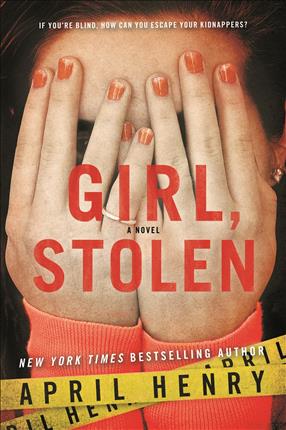| Girl, stolen (Girl, Stolen) Author: Henry, April | ||
| Price: $10.65 | ||
Summary:
When an impulsive carjacking turns into a kidnapping, Griffin, a high school dropout, finds himself more in sympathy with his wealthy, blind victim, sixteen-year-old Cheyenne, than with his greedy father.
Full Text Reviews:
School Library Journal - 10/01/2010 Gr 7–10—A trip to the pharmacy turns into a nightmare for Cheyenne Wilder, a blind teenager. Sick with pneumonia, she waits in the backseat of her stepmother's car when someone steals it, unintentionally kidnapping her. Things become even more complicated when the inadvertent kidnapper, Griffin, returns home to his hostile father and his criminal cronies, who have their own designs on Cheyenne upon learning that her father is the president of Nike. Still sick and held captive, Cheyenne must use her other senses and intellect to break free and find help before it's too late. The novel is a nail-biter with an unforgettable protagonist who smartly and bravely turns her weakness, and her captors' underestimation of her capabilities, into an advantage. Henry illuminates the teen's predicament using all of her intact senses, making every touch, sniff, and breath palpable. Cheyenne's growing sympathy for Griffin, who becomes her protector, adds layers of complexity to this thriller, especially when she faces leaving him injured in the woods or slowing her own escape by saving him. Readers will be hard-pressed to put this one down before its heart-pounding conclusion.—Jennifer Barnes, formerly at Homewood Library, IL - Copyright 2010 Publishers Weekly, Library Journal and/or School Library Journal used with permission.
Booklist - 09/15/2010 Bad: 16-year-old Cheyenne is sick with pneumonia. Badder: while her mother runs into the pharmacy, a young man steals the car, not realizing that Cheyenne is in the backseat. Worst: getting out of this situation is going to be even harder than expected, because Cheyenne is blind. This constant one-upping of the threat level is what gives Henry’s thriller its hurtling, downhill velocity. And, as it turns out, Cheyenne’s father is rich, which turns the accidental kidnapping into a ransom situation. But the plot is actually of secondary concern; the relationship between Cheyenne and the only kidnapper who is kind to her, a teen named Griffin, constitutes the novel’s central push and pull. Is there a genuine understanding and affection brewing between these two damaged teens? Or is this a case of Stockholm syndrome? Henry is particularly deft at portraying the vacillating level of trust between the two, and her research on living with blindness pays dividends in authenticity. Fairly predictable, but thoroughly exciting. - Copyright 2010 Booklist.
Bulletin for the Center... - 12/01/2010 Sixteen-year-old Cheyenne, waiting in the car outside the pharmacy, has pneumonia, and she just wants her stepmother to come out with her meds and drive her home. Unfortunately, Griffin, who gets in the car thinks he is stealing an unattended vehicle, doesn’t see the passenger curled up in the back seat until it is too late. The two teens, both shocked at the turn of events, end up at Griffin’s home, where his father, upon realizing that Cheyenne is the daughter of an extraordinarily wealthy man, turns this error into a ransom opportunity. Cheyenne, slowed by her illness, is nevertheless constantly calculating ways she can get Griffin, the only decent person out in the wilderness where she is being kept, on her side in order to escape from a situation that is unlikely to end well. Henry ably presents Cheyenne’s blindness as an aspect that is no more relevant than, for example, her pneumonia as an obstacle in her current horrific situation. She willingly shares details of her blindness with Griffin, first as a manipulation tool and then as part of the shaky bond they form, but otherwise, she simply focuses on escape, using her wits, daring, and strong will to get her home. The pace is impeccable, becoming rapidly more frantic as Cheyenne realizes her chances for success are dwindling. In addition, the premise itself is powerfully realistic and compelling, with one small incident (Griffin’s jumping into a car that had the keys in the ignition) snowballing into a nightmare series of events that will change everyone. Readers will likely recognize such pivotal-but hopefully far less dramatic-moments in their own lives. AS - Copyright 2010 The Board of Trustees of the University of Illinois.


